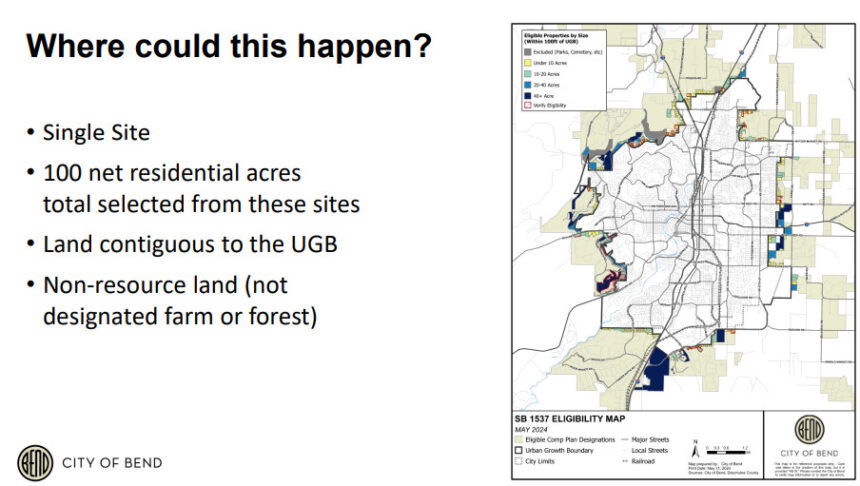City of Bend seeks developers of more affordable housing through accelerated urban growth boundary expansion

BEND, Ore. (KTVZ) The City of Bend said Tuesday it is seeking applications from eligible landowners who are interested in getting more affordable housing on the ground through a one-time, accelerated urban growth boundary expansion of up to 100 acres that Oregon lawmakers agreed to allow earlier this year.
The 2024 Oregon Legislature passed a bill, known as Senate Bill 1537 (SB 1537), aiming to support housing production and ease Oregon’s housing shortage.
The bill provides qualifying local governments a one-time option to add up to 100 net acres of residential land to their Urban Growth Boundary. Additional acreage may be included to support the future residents, such as for parks, schools, commercial spaces, and roads.
Any land added to the city through this process would require adoption of a conceptual plan including 30% of housing units to be affordable. As defined by the bill, affordable means a household making 80% of the area median income, which is $83,750 annually for a household of four if they are renting, or 130% area median income, or $136,110 annually for a household of 4, if they are purchasing a home.
The need for affordable housing is clear. Bend is ranked 179 out of 203 cities in the number of households with affordable housing costs. Only 8% of the local workforce can afford a home in the area.
“This council has been committed since day one to getting more affordable housing on the ground,” said Bend Mayor Melanie Kebler. “Using this bill can be one more tool we can use to make that happen.”
Using this bill, cities can go through an abbreviated UGB expansion process to build affordable and market-rate housing more quickly than a typical UGB expansion. Traditional UGB expansions take several years and require updates to the city’s housing capacity and economic opportunities analyses.
Once applications have been submitted, the public will have an opportunity to provide comments before the City Council selects the site. After the concept plan is adopted, the rest of the development steps will follow existing City of Bend processes and standards, including opportunities for public comment and hearings at the time of Master Plan and Annexation.
The conceptual plan for the site will need to include:
- A diversity of housing types
- A minimum density of ten dwelling units per acre
- Public open space
- Small-scale commercial or mixed-use
- A transportation network with connectivity that allows for options for bikes, pedestrians, and transit
The State of Oregon requires cities to accommodate and plan for future population and employment growth within an urban growth boundary (UGB). A UGB acts as an invisible boundary that surrounds cities and limits the expansion of urban development. The community informs how and where Bend grows up and out through public engagement. The input provided by the community informs Bend’s Comprehensive Plan. This plan becomes local law and impacts how and where things get built over time. Learn more about how the City of Bend plans for growth at bendoregon.gov/growth.
Applications are due on Oct. 14 by 5 p.m. More information about this project can be found at One-Time Urban Growth Boundary Expansion - Senate Bill 1537.